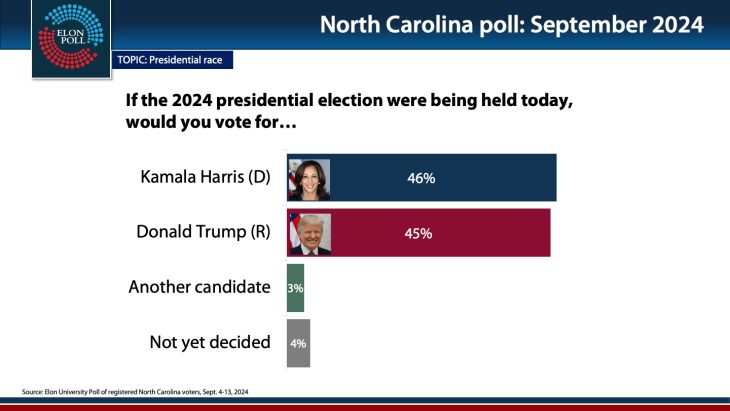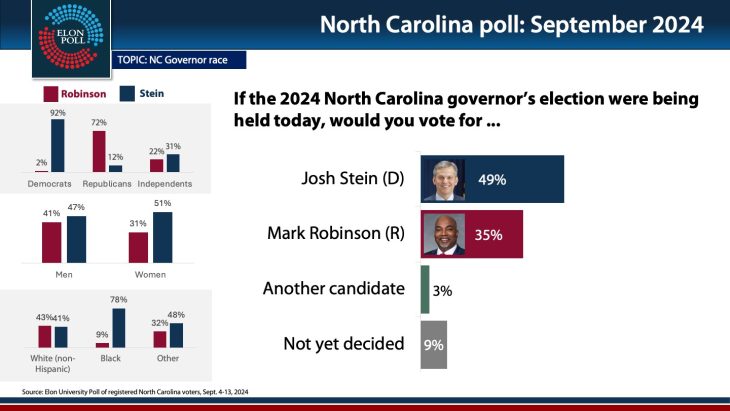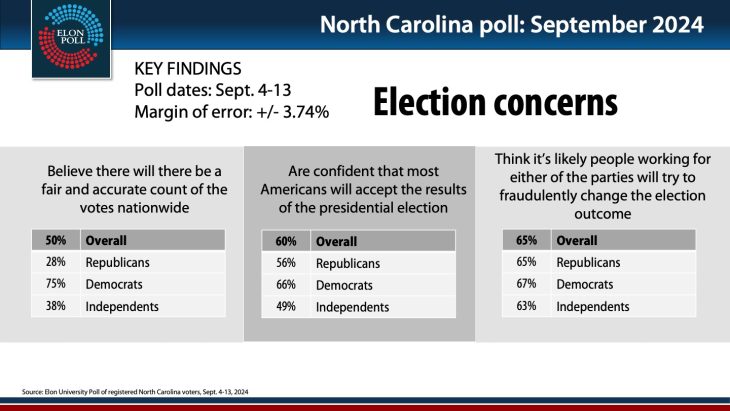The survey of 800 registered voters in North Carolina was conducted Sept. 4-13 and explored issues such as AI’s role in the election, pre- and post-election violence and which presidential candidate voters favor on many issues.
North Carolina has emerged as a key battleground state in the presidential race and the Elon University Poll has found the two major party candidates essentially tied with a little more than a month until Election Day.
In its survey of N.C. registered voters conducted Sept. 4-13, the Elon Poll found that Harris was favored by 46% compared with 45% for Republican Donald Trump. The results are too close to distinguish from one another, with the one-point gap well within the poll’s margin of error of +/- 3.74 percentage points.
There is a significantly larger margin in North Carolina’s governor’s race with Democrat Josh Stein holding a 14-point lead over Mark Robinson, with 49 percent of voters favoring Stein and 35 percent supporting Robinson. The survey was conducted before recent media reports that Robinson allegedly posted objectionable content and statements on a pornography site.
“In the big picture, what happens over the next six weeks in North Carolina could determine who leads the United States for the next four years,” said Professor Jason Husser, director of the Elon Poll. “In the small picture in which, accounting for rounding, Harris and Trump are less than 1 point apart and few undecided likely voters remain, the race down the home stretch for North Carolina’s 16 electoral college votes is now one over inches not yards.”
This is the second of three surveys planned by the Elon Poll during the fall 2024 election season and was conducted during a period that included the presidential debate on Sept. 10. The survey also assessed which presidential candidate voters prefer on specific issues, how voters think an immigration crackdown could impact the economy and how voters expect artificial intelligence to influence the election.
> See a full analysis of the poll results with charts.
Presidential race
North Carolina is attracting sustained attention from the Harris and the Trump campaigns, with multiple visits to the state this fall as the candidates try to move the needle in the close race. With only a one-point difference in the race, only four percent of registered voters said they had yet to make up their minds on the presidential race. While the overall percentages for the two candidates were very close, there were wide differences among some groups of voters.

Members of the two major parties favored their own candidates by overwhelming margins but Trump polled stronger among independent voters, receiving 38%, compared with 22% for Harris. Harris drew support from 79% of Black voters compared with only 10% favoring Trump. Harris also led among women voters by 48% to 42%. Male voters are more likely to favor Trump (49%) than Harris (43%) and Trump has a commanding lead of 55% to 37% among white voters.
When asked about their overall impressions of the two candidates, voters gave slightly less favorable marks to Trump than when the Elon Poll conducted its last survey in early August. At that time, Trump and Harris were each viewed unfavorably by 50% of voters. In this new poll, Trump was viewed unfavorably by 52% of voters, with Harris viewed unfavorably by 49% of voters. When voters were asked which candidate is someone they would like to have dinner with, one in four voters said neither.
In questions about the two candidates for vice president, Democrat Tim Walz was viewed as an asset to the Harris campaign by 43% while Republican JD Vance was viewed as an asset to the Trump campaign by 32%.
In terms of campaign momentum, 45% of N.C. voters said the Harris campaign is gaining support while 34% said the Trump campaign is building momentum. What do voters think about how the media is covering the campaigns? Comparing major media coverage of the campaigns, voters tended to think Harris was benefiting more. Thirty-five percent said reporting on Trump was too negative compared to 7% who said coverage of Harris was too negative.
“Barring a major unforeseen event moving the needle, the details will be decisive for president in North Carolina,” Husser said. “Logistics of voter turnout operations will be essential. Also, critical for each campaign will be priming issues most favorable to their side to the tops of minds among the low percentage of still persuadable voters.”
The Elon Poll also asked voters to weigh in on which candidate they viewed as strong on specific issues. Voters preferred Harris over Trump on environmental sustainability and were more likely to say she has the right temperament and judgement to be president. Trump led Harris on promoting a healthy and growing economy and solving issues related to immigration and border security.
Immigration has been a top topic during the presidential campaign, with discussions around changing federal policies and the approach to the border. The Elon Poll asked N.C. voters how they think a crackdown on immigration would impact the economy at various levels and found that 54 percent of voters expect such a move to favorably impact the national economy and 47 percent expect it would be a benefit to their local economy.
North Carolina governor’s race
This poll was conducted before the Sept. 19 media reports about objectionable online posts allegedly written by Republican candidate Mark Robinson. In this poll, Democrat Josh Stein was favored by 49% of voters compared with 35% for Robinson. Stein led among both men and women as well as with independent voters and was supported by 78% of Black voters while only 9% of Black voters favored Robinson. Fifty-five percent of voters had a favorable impression of Stein, compared with only 32% with a favorable impression of Robinson.

“North Carolina started this cycle with what seemed the most competitive and most impactful governor’s race in the nation,” Husser said. “The race is no longer particularly competitive given Josh Stein’s historically unusual lead over Mark Robinson. However, potential remains for the race to be the most impactful if voters respond to negativity around Robinson by associating their opinions about him with other Republicans, both up and down the ballot.”
The issue of abortion restrictions continues to be important for voters as they consider their votes for governor. Seventeen percent said the abortion issue is their highest priority and 49% said it is an important priority. Only 17% favored increased restrictions on abortion while 47% favored decreased restrictions.
Election concerns
The Elon Poll has been tracking voter opinions about the integrity of this year’s election and again found serious concerns about the accuracy of the vote count and how artificial intelligence could impact the election.
- Only 50% said they believe this year’s election will produce a fair and accurate count of the votes cast nationwide.
- 65% said it’s likely that people working for either of the major political parties will try to fraudulently change the election outcome; this view was held equally by Republicans, Democrats and independents
- 56% were concerned that voters will be intimidated or harassed when going to the polls, including 68% of Democrats who hold that concern. More than seven in 10 voters were concerned about election-related violence breaking out shortly after the election or around the Inauguration.
- 41% said they had little or no confidence that most Americans will accept the results of the presidential election.
- 80% said the use of artificial intelligence to manipulate social media will affect the outcome of the presidential election.

“On worries ranging from violence to election inaccuracy to AI manipulation, we continue to find a wary electorate on edge in North Carolina,” Husser said. “However, voters indicate that all optimism is not lost with only 12 percent referring to America’s future in decline compared to 58 percent saying difficult or uncertain and 22 percent saying bright or prosperous.”
Poll Methodology
This survey was constructed by the Elon University Poll in partnership with The Charlotte Observer, The News & Observer and The Durham Herald-Sun and fielded by the international marketing and polling firm YouGov as an online, web-based survey, self-administered with online panels. YouGov interviewed 940 respondents who were registered voters in North Carolina. These respondents were then matched down to a sample of 800 to produce the final dataset.
Throughout this report, the analysis of partisan differences compares the views of Republicans plus those who lean Republican in their voting preference with Democrats plus those who lean Democratic. A sample composition file from the survey provides more details.
The margin of error for this poll (adjusted for weights) is +/-3.74%.


